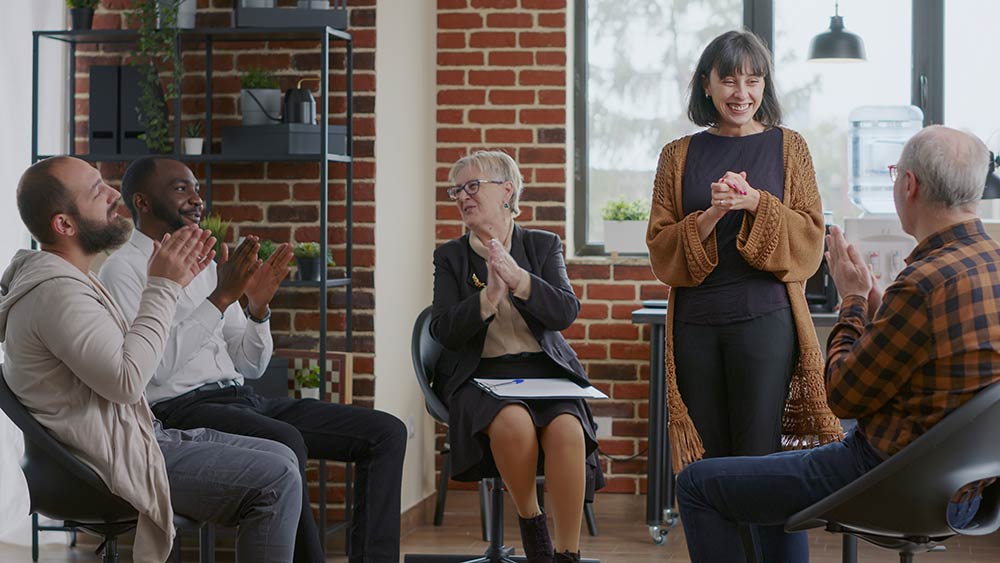Table of Contents
TL;DR:
- Rehab therapy addresses the psychological and emotional aspects of addiction.
- Common types of therapy include CBT, DBT, MI, group therapy, and family therapy.
- Specialized therapies like art therapy, equine therapy, and meditation can be added to a treatment plan.
- Choosing the right therapy is a personal decision and may involve trying different options to find what works best.
——————————————————————————————-
The path to overcoming drug addiction is rarely smooth. It can be filled with challenges and setbacks, but it’s a journey worth taking. Drug rehab is often a crucial part of that journey where healing begins.
But what exactly can you expect from a rehab center? While the specifics vary, one thing remains constant: the essential role of therapy.
Let’s explore more about rehab with the common types of rehab therapy and how they help people rebuild their lives from the ground up.
What is Rehabilitation?
Rehabilitation, often called rehab, is a holistic approach that addresses the physical, psychological, and social aspects of addiction.
The goal of rehab is not just abstinence but also embracing a new way of life. It’s about uncovering the root causes of addiction and equipping individuals with the tools and support needed to achieve lasting recovery.
Rehab therapy is a big part of this holistic approach. It offers a variety of evidence-based treatments to help individuals heal.
What is Rehabilitation Therapy?
Rehab therapy is a structured process designed to address the psychological and emotional aspects of addiction. It’s usually led by a qualified addiction therapist who specializes in the treatment of substance use disorders.
It’s a safe and supportive space where people can:
- Explore the underlying causes of their substance abuse.
- Develop healthier coping mechanisms.
- Change destructive behaviors.
Ultimately, therapy helps people understand their thoughts, feelings, and actions, guiding them to a more fulfilling and sober life.
Common Types of Therapy in Rehab
There are several main rehab therapy approaches, each with its own special focus and benefits.
Cognitive Behavioral Therapy (CBT)
Cognitive behavioral therapy helps people identify and challenge negative thoughts and beliefs that lead to substance abuse. By recognizing and replacing these harmful thoughts with healthier ones, individuals can change their behaviors and reactions to triggers. This can also lower the risk of relapse.
CBT is also effective for treating mental health disorders like depression and anxiety.
Dialectical Behavior Therapy (DBT)
Dialectical behavior therapy is especially useful for people who struggle with intense emotions, impulsivity, and relationship problems. It helps them develop skills in emotional regulation, mindfulness, distress tolerance, and effective communication.
DBT teaches individuals to manage their emotions healthily, handle relationship challenges, and cope with stress without using substances.
Motivational Interviewing (MI)
Motivational interviewing is a client-centered approach that helps people explore their mixed feelings about change. It helps strengthen their motivation to overcome addiction.
To guide individuals in finding their own reasons for change and creating a plan to achieve their goals, therapists use:
- Empathetic listening
- Open-ended questions
- Positive feedback
MI builds self-confidence and empowers people to take control of their recovery journey.
Group Therapy
Group therapy helps people connect with others who have similar experiences. It creates a sense of community, belonging, and understanding.
Group members learn from each other, share coping strategies, and build a supportive network.
The group setting also promotes accountability and helps individuals stay committed to their recovery goals.
Family Therapy
Addiction impacts both the person and their family. Family therapy can help address these effects.
It helps family members:
- Understand addiction.
- Improve communication.
- Resolve conflicts.
- Heal from the pain caused by substance abuse.
Family therapy also supports the individual’s recovery by creating a healthy and supportive home environment.
These main therapy approaches, often used together, provide a complete way to tackle the complex challenges of addiction. With the help of skilled therapists, individuals can gain the insights, skills, and support they need to overcome substance abuse and build a fulfilling life in recovery.
Specialized Therapies and Additional Support
In addition to the core therapies, rehab centers often offer various specialized therapies and extra support to meet individual needs and preferences. These additional approaches can improve the recovery process by addressing specific challenges and encouraging personal growth.
Some of the specialized therapies used in rehab include:
Art Therapy
Art therapy gives people a creative way to express their emotions, explore their experiences, and process trauma.
This can be done through:
- Painting
- Drawing
- Sculpting
- Music/dance
- Photography
- And more
Through art therapy, people can communicate thoughts and feelings that are hard to put into words, promoting healing and self-discovery.
Equine Therapy
Equine therapy involves working with horses in a therapeutic setting.
This approach can:
- Improve self-awareness
- Build trust
- Enhance communication skills
- Help with emotional regulation
The nonverbal communication and unconditional acceptance from horses can be especially helpful for those who find traditional talk therapy challenging.
Mindfulness and Meditation
Mindfulness and meditation practices help people focus on the present moment and accept their thoughts and feelings without judgment.
These techniques can:
- Reduce stress
- Manage cravings
- Develop healthier coping skills
Mindfulness-based interventions have shown promising results in addiction treatment by promoting emotional regulation and preventing relapse.
Combining individual and group therapy with specialized approaches creates a comprehensive rehab plan. Using various therapeutic tools can help individuals increase their chances of lasting recovery and build a healthier, more fulfilling life.
Choosing the Right Therapy for You
With so many therapy options available, remember that rehabilitation is a personal journey. The most effective approach isn’t the same for everyone. The best type of therapy depends on your needs, preferences, and the specifics of your addiction.
Don’t be afraid to explore different options and talk openly with your treatment team about your experiences. They can help you create a personalized treatment plan that aligns with your goals.
If you or a loved one is struggling with addiction, know that you are not alone. Infinite Recovery is here to support you with compassion on your journey to healing. Our experienced team understands the complexities of addiction and offers a wide range of evidence-based therapies to help you break free.
Reach out to Infinite Recovery today to learn more about our personalized rehab programs and start your journey toward lasting recovery. It’s never too late to reclaim your life and embrace a future filled with hope and possibility.

















